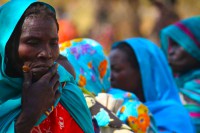
This article was written by STAND’s Programs Intern Michael Mansheim, a senior at American University studying International Relations.
I recently attended a talk given at American University by Linda Bashai, Senior Program Officer in the Center for Middle East and Africa at the United States Institute of Peace. She spoke concerning recent events in Sudan and South Sudan, focusing on the shift that had occurred pre-2011 that caused South Sudan to split from the north.
Bashai broke Sudan pre-split down into four basic aspects: markets, media, culture, and law.
The first of these aspects is the market of Sudan. Bashai reported that when it comes to Africa, there are typically two ways that people think about economic growth. The first is that once African countries have access to free and open markets, development will increase and the issue of poor development will be dealt with. The second theory is that all economic problems in Africa stem from colonialism and the neo-colonialism of corporations and western interference in Africa. Bashai suggested that both of these have some elements of truth, however, what they miss out on is that colonialism is not necessarily the driver of inequality; instead poor management by African leaders and graft are reasons goods can’t reach free markets.
Before the split with South Sudan, Sudan was experiencing a 5% per year growth rate due to the large deposits of oil the country possesses. However, the Sudanese economy is now faltering; the majority of the oil now officially belongs to the South Sudanese (South Sudan now controls about 75% of the oil that was in Sudan pre-independence) and quick oil profits meant that Sudanese government leadership never took the opportunity to diversify their investments. China, interested in the oil to satiate their growing demands, invested heavily in Sudan. Well known in Africa for doing business with any country without political considerations, the Chinese got busy building ports, roads, bridges, giving loans and technical knowledge to a burgeoning Sudanese arms industry. In return, Sudan sold China 70% of its oil, and China sold Sudan weapons circumventing the arms embargo on weapons to be used in Darfur.
On the topic of weapons, Al-Bashir invests heavily in the Sudanese military, creating multiple military forces so that none can become too powerful and depose him. In fact, many government agencies have their own armed force. Despite the strength of the Sudanese forces, they have never been deployed to protect the borders of the country; the Sudanese armed forces have always been deployed internally.
The Sudanese media is another important aspect of Sudan. The Western news media often portrays Al-Bashir as a monolith, a strong man running Sudan. However, Bashai reports that instead Sudan is run by Al-Bashir with an oligarchy of prominent ministers, more like a board of directors instead of an iron fisted tyrant. Media in Sudan is mostly state-run, and widely reports the idea that Sudanese economic issues are due to neo-colonialism and US thirst for oil. The government limits knowledge of atrocities and human rights abuses, and controls the internet to restrict access to knowledge of the problems in the country. The most surprising revelation that Bashai had was that the average Sudanese citizen has no idea how their country is perceived by the rest of the world.
Culturally, Sudan is often split. The capital city of Khartoum is a very international city that tries very hard to maintain a Middle East identity. Due to the high level of development in the city, a core and periphery relationship has developed with the highly underdeveloped nature of the rest of Sudan. Although 97% of Sudan is Muslim, a great divide has been constructed by the government and society to exist between Arab and African Muslims in the country. This rivalry was exacerbated due to policies enacted during the 1960’s and recently due to the desertification of the southern regions of Sudan and South Sudan. The allocation of oil wealth has vastly favored the “Arab Muslims”, who make up much of the country’s elite.
The last aspect is law: both domestically and internationally, law is something with which Sudan struggles. The ICC has called for the arrest of Al-Bashir, the first time this has happened to a sitting world leader. To deal with the issues created in Darfur and elsewhere, Bashai suggested the creation of hybrid tribunals, something done in the wake of the Khmer Rouge in Cambodia. Sudan’s government has domestically popularized the idea that the ICC is stacking the deck against Africans, as Africans have been primarily targeted for arrest and prosecution by the court. This perception is a major factor holding back prosecution of the crimes committed in Sudan.
Democracy is a long way off, as opposition parties have been bought off or threatened into coalescence; most citizens in Sudan understand the lack of legitimacy opposition are afforded. Al-Bashir, although in some ways weak due to the removal of much oil wealth, is hard to topple. Al-Bashir shouldn’t be in office, but the process of removal must be done with great care so as to not create a power vacuum in the region.
Bashai concluded by saying that it will be very hard to fix the problems Sudan and South Sudan are facing. There is very little government legitimacy, limited legal institutions or civil society and the creation of these things begets a massive cultural and governmental shift in the country. Institutions made corrupt or ineffective under the Al-Bashir government have to change to help the people of the Sudans. However, despite the intense subject matter, Bashai ended by reminding the audience that there is no monopoly on good governance.
